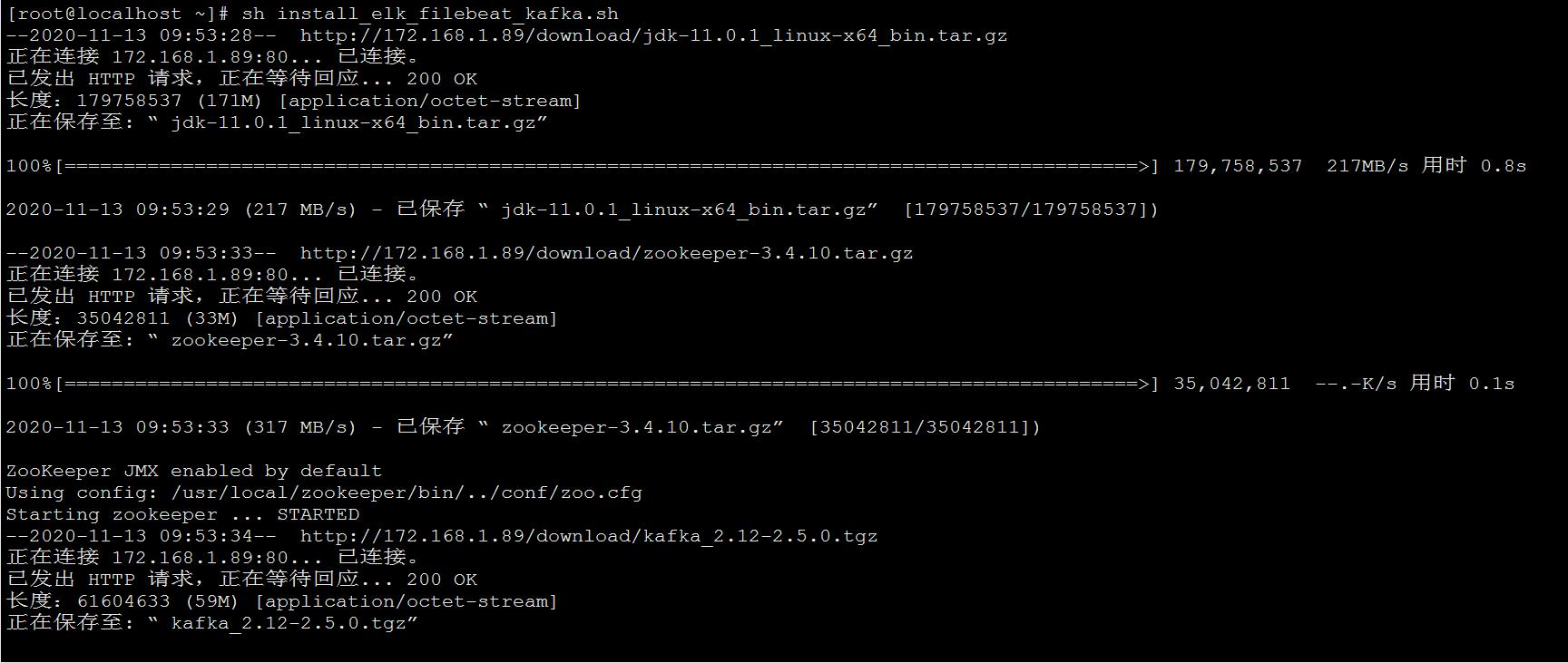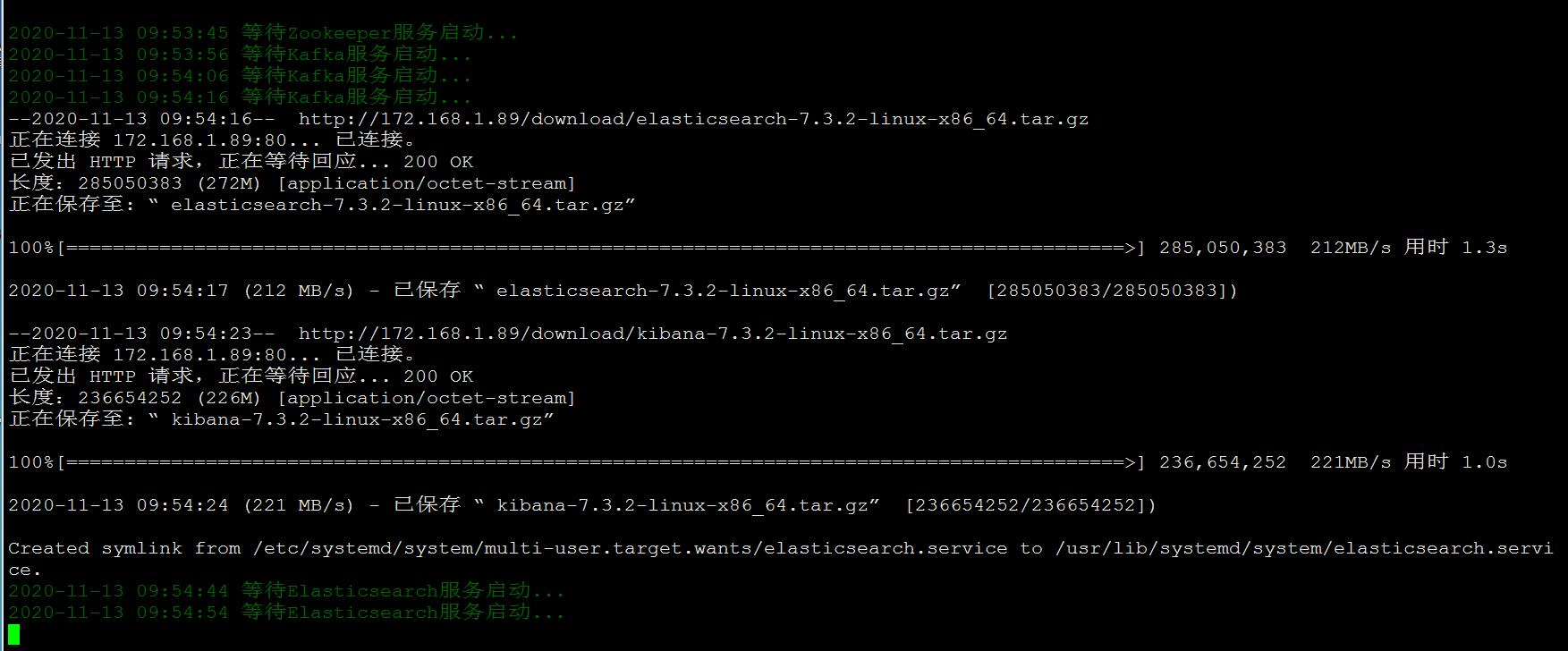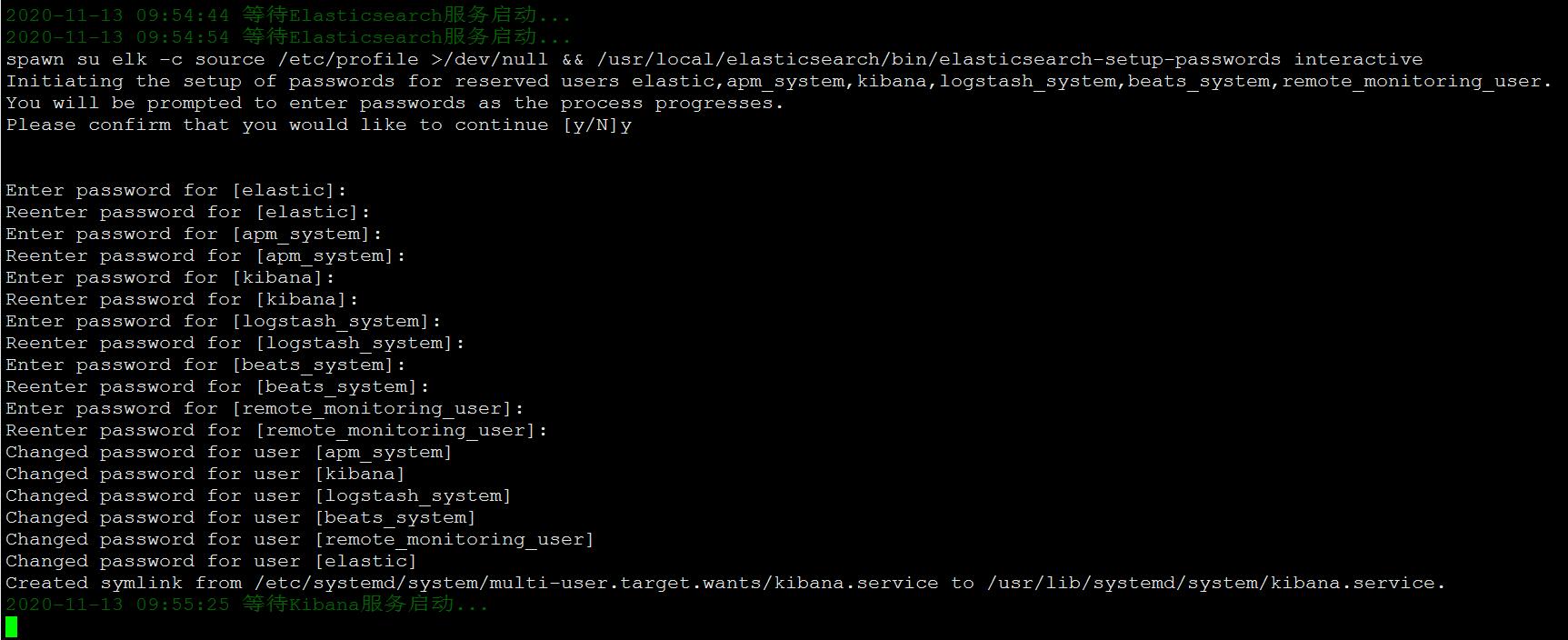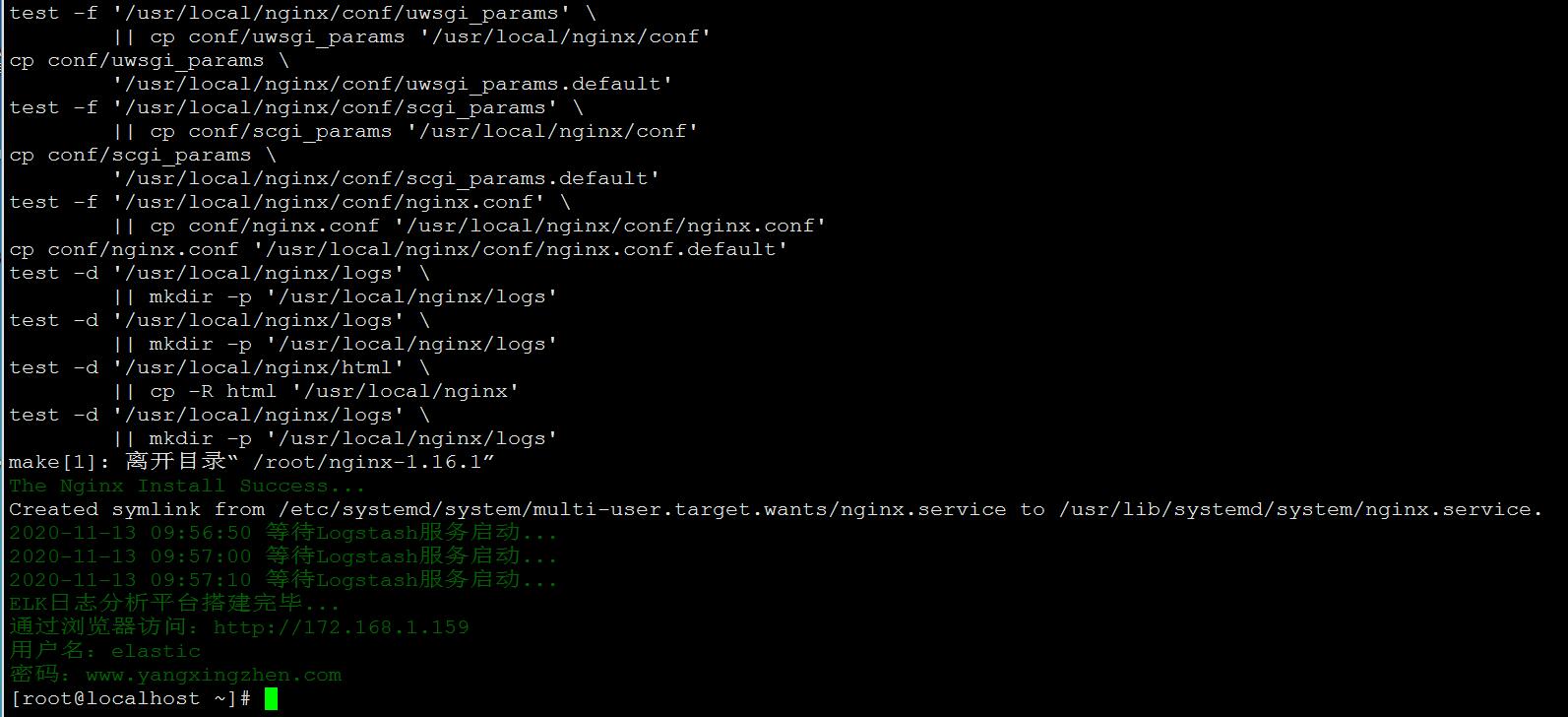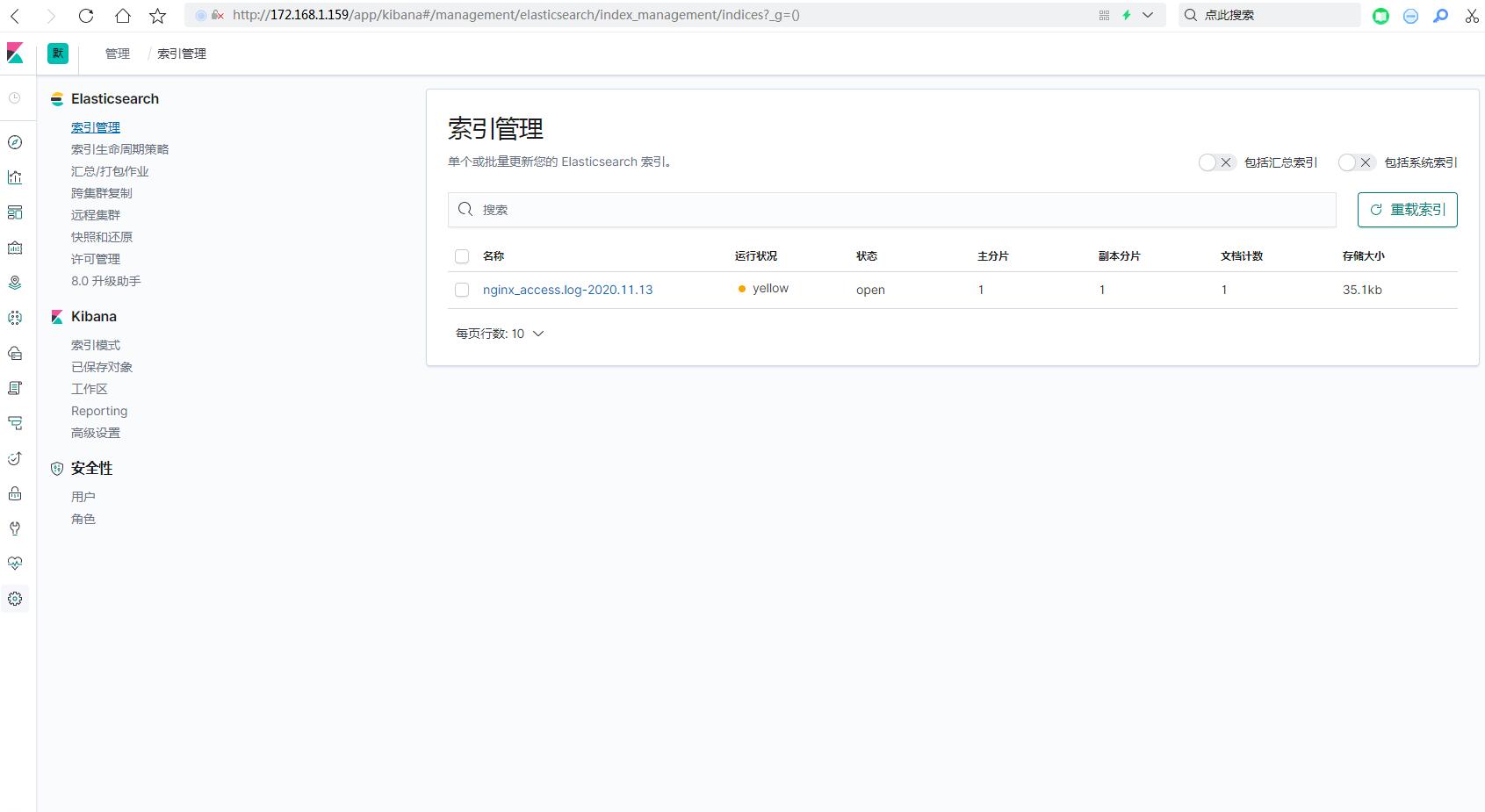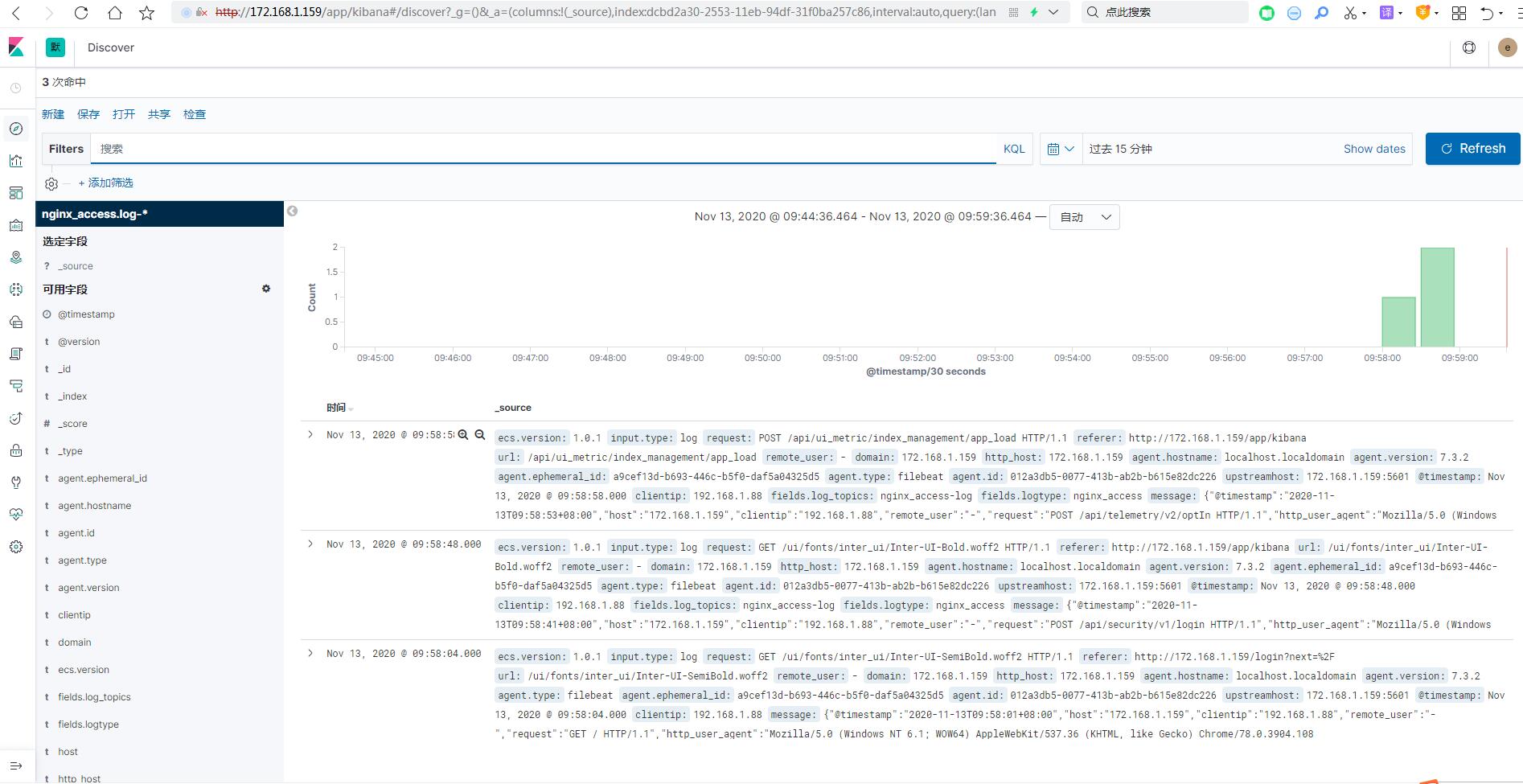此脚本是Linux一键部署ELK日志平台自动化脚本,有需要朋友可以参考,脚本内容如下:
环境准备
操作系统:CentOS Linux release 7.8.2003
软件版本
elasticsearch:elasticsearch-7.5.1-linux-x86_64.tar.gz
kibana:kibana-7.5.1-linux-x86_64.tar.gz
logstash:logstash-7.5.1.tar.gz
filebeat:filebeat-7.5.1-linux-x86_64.tar.gz
JDK:jdk-11.0.1_linux-x64_bin.tar.gz
Nginx:nginx-1.18.0.tar.gz
Zookeeper:zookeeper-3.4.10.tar.gz
Kafka:kafka_2.12-2.5.0.tgz
脚本功能
1)一键安装Elasticsearch、Kibana、Logstash、Filebeat
2)一键安装Zookeeper
3)一键安装Kafka
4)一键安装Nginx
5)自动添加nginx_access、nginx_error索引
6)自动配置Elasticsearch用户密码
[root@localhost ~]# vim install_elk_filebeat_kafka.sh
#!/bin/bash
#Date:2019-5-20 13:14:00
#Author Blog:
# https://www.yangxingzhen.com
# https://www.yangxingzhen.cn
#Author WeChat:
# 微信公众号:小柒博客
#Author mirrors site:
# https://mirrors.yangxingzhen.com
#About the Author
# BY:YangXingZhen
# Mail:xingzhen.yang@yangxingzhen.com
# QQ:675583110
User="elk"
Elasticsearch_User="elastic"
Elasticsearch_Passwd="www.yangxingzhen.com"
IPADDR=$(hostname -I \|awk '{print $1}')
Elasticsearch_DIR="/data/elasticsearch"
Kafka_IP=$(hostname -I \|awk '{print $1}')
Zookeeper_IP=$(hostname -I \|awk '{print $1}')
Elasticsearch_IP=$(hostname -I \|awk '{print $1}')
Define JDK path variables
=========================
JDK_URL=https://mirrors.yangxingzhen.com/jdk
JDK_File=jdk-11.0.1_linux-x64_bin.tar.gz
JDK_File_Dir=jdk-11.0.1
JDK_Dir=/usr/local/jdk-11.0.1
Define Zookeeper path variables
===============================
Zookeeper_URL=http://archive.apache.org/dist/zookeeper/zookeeper-3.4.10
Zookeeper_File=zookeeper-3.4.10.tar.gz
Zookeeper_File_Dir=zookeeper-3.4.10
Zookeeper_PREFIX=/usr/local/zookeeper
Define Kafka path variables
===========================
Kafka_URL=https://archive.apache.org/dist/kafka/2.5.0
Kafka_File=kafka_2.12-2.5.0.tgz
Kafka_File_Dir=kafka_2.12-2.5.0
Kafka_Dir=/usr/local/kafka
Define Nginx path variables
===========================
Nginx_URL=http://nginx.org/download
Nginx_File=nginx-1.18.0.tar.gz
Nginx_File_Dir=nginx-1.18.0
Nginx_Dir=/usr/local/nginx
Define Elasticsearch path variables
===================================
Elasticsearch_URL=https://artifacts.elastic.co/downloads/elasticsearch
Elasticsearch_File=elasticsearch-7.5.1-linux-x86_64.tar.gz
Elasticsearch_File_Dir=elasticsearch-7.5.1
Elasticsearch_Dir=/usr/local/elasticsearch
Define Logstash path variables
==============================
Filebeat_URL=https://artifacts.elastic.co/downloads/beats/filebeat
Filebeat_File=filebeat-7.5.1-linux-x86_64.tar.gz
Filebeat_File_Dir=filebeat-7.5.1-linux-x86_64
Filebeat_Dir=/usr/local/filebeat
Define Kafka path variables
===========================
Logstash_URL=https://artifacts.elastic.co/downloads/logstash
Logstash_File=logstash-7.5.1.tar.gz
Logstash_File_Dir=logstash-7.5.1
Logstash_Dir=/usr/local/logstash
Define Kibana path variables
============================
Kibana_URL=https://artifacts.elastic.co/downloads/kibana
Kibana_File=kibana-7.5.1-linux-x86_64.tar.gz
Kibana_File_Dir=kibana-7.5.1-linux-x86_64
Kibana_Dir=/usr/local/kibana
配置内核参数
======
cat \>\>/etc/security/limits.conf \<\<EOF
* soft nofile 65537
* hard nofile 65537
* soft nproc 65537
* hard nproc 65537
EOF
if \[ $(grep -wc "4096" /etc/security/limits.d/20-nproc.conf) -eq 0 \];then
cat \>\>/etc/security/limits.d/20-nproc.conf \<\<EOF
*
soft nproc 4096
EOF
fi
cat \>/etc/sysctl.conf \<\<EOF
net.ipv4.tcp_max_syn_backlog = 65536
net.core.netdev_max_backlog = 32768
net.core.somaxconn = 32768
net.core.wmem_default = 8388608
net.core.rmem_default = 8388608
net.core.rmem_max = 16777216
net.core.wmem_max = 16777216
net.ipv4.tcp_timestamps = 0
net.ipv4.tcp_synack_retries = 2
net.ipv4.tcp_syn_retries = 2
net.ipv4.tcp_tw_recycle = 1
net.ipv4.tcp_tw_reuse = 1
net.ipv4.tcp_mem = 94500000 915000000 927000000
net.ipv4.tcp_max_orphans = 3276800
net.ipv4.tcp_fin_timeout = 120
net.ipv4.tcp_keepalive_time = 120
net.ipv4.ip_local_port_range = 1024 65535
net.ipv4.tcp_max_tw_buckets = 30000
fs.file-max=655350
vm.max_map_count = 262144
net.core.somaxconn= 65535
net.ipv4.ip_forward = 1
net.ipv6.conf.all.disable_ipv6=1
EOF
sysctl -p使其配置生效
===============
sysctl -p \>/dev/null
创建elk用户
=======
\[ $(grep -wc "elk" /etc/passwd) -eq 0 \] \&\& useradd elk \>/dev/null
安装JDK环境
=======
java -version \>/dev/null 2\>\&1
if \[ $? -ne 0 \];then
# Install Package
\[ -f /usr/bin/wget \] \|\| yum -y install wget \>/dev/null
wget -c ${JDK_URL}/${JDK_File}
tar xf ${JDK_File}
mv ${JDK_File_Dir} ${JDK_Dir}
cat \>\>/etc/profile \<\<EOF
export JAVA_HOME=${JDK_Dir}
export CLASSPATH=$CLASSPATH:$JAVA_HOME/lib:$JAVA_HOME/jre/lib
export PATH=$JAVA_HOME/bin:$JAVA_HOME/jre/bin:$PATH:$HOMR/bin
EOF
fi
加载环境变量
======
source /etc/profile \>/dev/null
Install Zookeeper
=================
if \[ -d ${Zookeeper_PREFIX} \];then
echo -e "\\033\[31mThe Zookeeper Already Install...\\033\[0m"
exit 1
else
cd \~ \&\& wget -c ${Zookeeper_URL}/${Zookeeper_File}
tar xf ${Zookeeper_File}
\\mv ${Zookeeper_File_Dir} ${Zookeeper_PREFIX}
chown -R root.root ${Zookeeper_PREFIX}
mkdir -p ${Zookeeper_PREFIX}/{data,logs}
\\cp ${Zookeeper_PREFIX}/conf/zoo_sample.cfg ${Zookeeper_PREFIX}/conf/zoo.cfg
cat \>${Zookeeper_PREFIX}/conf/zoo.cfg \<\<EOF
#服务器之间或客户端与服务器之间的单次心跳检测时间间隔,单位为毫秒
tickTime=2000
#集群中的follower服务器(F)与leader服务器(L)之间初始连接时能容忍的最多心跳数(tickTime的数量)
initLimit=10
#集群中flower服务器(F)跟leader(L)服务器之间的请求和答应最多能容忍的心跳数
syncLimit=5
#客户端连接Zookeeper服务器的端口,Zookeeper会监听这个端口,接受客户端的访问请求
clientPort=2181
#存放数据文件
dataDir=${Zookeeper_PREFIX}/data
#存放日志文件
dataLogDir=${Zookeeper_PREFIX}/logs
#Zookeeper cluster,2888为选举端口,3888为心跳端口
#服务器编号=服务器IP:LF数据同步端口:LF选举端口
server.1=${IPADDR}:2888:3888
EOF
写入服务ID编号
========
echo "1" \> ${Zookeeper_PREFIX}/data/myid
Add power on self start And Start Zookeeper
===========================================
source /etc/profile \>/dev/null \&\& ${Zookeeper_PREFIX}/bin/zkServer.sh start
fi
Install Kafka Soft
==================
if \[ ! -d ${Kafka_Dir} \];then
cd \~ \&\& wget -c ${Kafka_URL}/${Kafka_File}
tar xf ${Kafka_File}
mv ${Kafka_File_Dir} ${Kafka_Dir}
编辑配置文件
======
cat \>${Kafka_Dir}/config/server.properties \<\<EOF
listeners=PLAINTEXT://${IPADDR}:9092
num.network.threads=3
num.io.threads=8
socket.send.buffer.bytes=102400
socket.receive.buffer.bytes=102400
socket.request.max.bytes=104857600
log.dirs=/tmp/kafka-logs
num.partitions=10
num.recovery.threads.per.data.dir=1
offsets.topic.replication.factor=1
transaction.state.log.replication.factor=1
transaction.state.log.min.isr=1
log.retention.hours=168
log.segment.bytes=1073741824
log.retention.check.interval.ms=300000
zookeeper.connect=${IPADDR}:2181
zookeeper.connection.timeout.ms=60000
group.initial.rebalance.delay.ms=0
EOF
判断Zookeeper服务是否启动,启动成功才执行以下操作
=============================
Code=""
while sleep 10
do
echo -e "\\033\[32m$(date +'%F %T') 等待Zookeeper服务启动...\\033\[0m"
# 获取Zookeeper服务端口
\[ -f /usr/bin/netstat \] \|\| yum -y install net-tools \>/dev/null
netstat -lntup \|grep "2181" \>/dev/null
if \[ $? -eq 0 \];then
Code="break"
fi
${Code}
done
启动Kafka服务
=========
source /etc/profile \>/dev/null \&\& ${Kafka_Dir}/bin/kafka-server-start.sh -daemon ${Kafka_Dir}/config/server.properties
判断Kafka服务是否启动,启动成功才执行以下操作
=========================
Code=""
while sleep 10
do
echo -e "\\033\[32m$(date +'%F %T') 等待Kafka服务启动...\\033\[0m"
# 获取Kafka服务端口
netstat -lntup \|grep "9092" \>/dev/null
if \[ $? -eq 0 \];then
Code="break"
fi
${Code}
done
else
echo -e "\\033\[31mThe Kafka Already Install...\\033\[0m"
exit 1
fi
Install Elasticsearch
=====================
if \[ ! -d ${Elasticsearch_Dir} \];then
# Install Package
\[ -f /usr/bin/wget \] \|\| yum -y install wget \>/dev/null
cd \~ \&\& wget -c ${Elasticsearch_URL}/${Elasticsearch_File}
tar xf ${Elasticsearch_File}
mv ${Elasticsearch_File_Dir} ${Elasticsearch_Dir}
else
echo -e "\\033\[31mThe Elasticsearch Already Install...\\033\[0m"
exit 1
fi
Install Kibana
==============
if \[ ! -d ${Kibana_Dir} \];then
# Install Package
\[ -f /usr/bin/wget \] \|\| yum -y install wget \>/dev/null
cd \~ \&\& wget -c ${Kibana_URL}/${Kibana_File}
tar xf ${Kibana_File}
mv ${Kibana_File_Dir} ${Kibana_Dir}
else
echo -e "\\033\[31mThe Kibana Already Install...\\033\[0m"
exit 1
fi
配置Elasticsearch
===============
mkdir -p ${Elasticsearch_DIR}/{data,logs}
cat \>${Elasticsearch_Dir}/config/elasticsearch.yml \<\<EOF
节点名称
====
node.name: es-master
存放数据目录,先创建该目录
=============
path.data: ${Elasticsearch_DIR}/data
存放日志目录,先创建该目录
=============
path.logs: ${Elasticsearch_DIR}/logs
节点IP
====
network.host: ${Elasticsearch_IP}
tcp端口
=====
transport.tcp.port: 9300
http端口
======
http.port: 9200
主合格节点列表,若有多个主节点,则主节点进行对应的配置
===========================
cluster.initial_master_nodes: \["${Elasticsearch_IP}:9300"\]
是否允许作为主节点
=========
node.master: true
是否保存数据
======
node.data: true
node.ingest: false
node.ml: false
cluster.remote.connect: false
跨域
===
http.cors.enabled: true
http.cors.allow-origin: "\*"
配置X-Pack
========
http.cors.allow-headers: Authorization
xpack.security.enabled: true
xpack.security.transport.ssl.enabled: true
EOF
配置Kibana
========
cat \>${Kibana_Dir}/config/kibana.yml \<\<EOF
server.port: 5601
server.host: "${Elasticsearch_IP}"
elasticsearch.hosts: \["http://${Elasticsearch_IP}:9200"\]
elasticsearch.username: "${Elasticsearch_User}"
elasticsearch.password: "${Elasticsearch_Passwd}"
logging.dest: ${Kibana_Dir}/logs/kibana.log
i18n.locale: "zh-CN"
EOF
创建Kibana日志目录
============
\[ -d ${Kibana_Dir}/logs \] \|\| mkdir ${Kibana_Dir}/logs
授权ELK用户管理Elasticsearch、Kibana
=============================
chown -R ${User}.${User} ${Elasticsearch_Dir}
chown -R ${User}.${User} ${Elasticsearch_DIR}
chown -R root.root ${Kibana_Dir}
创建systemctl管理配置文件
=================
cat \>/usr/lib/systemd/system/elasticsearch.service \<\<EOF
\[Unit\]
Description=elasticsearch
After=network-online.target remote-fs.target nss-lookup.target
Wants=network-online.target
\[Service\]
LimitCORE=infinity
LimitNOFILE=655360
LimitNPROC=655360
User=${User}
Group=${User}
PIDFile=${Elasticsearch_Dir}/logs/elasticsearch.pid
ExecStart=${Elasticsearch_Dir}/bin/elasticsearch
ExecReload=/bin/kill -s HUP $MAINPID
ExecStop=/bin/kill -s TERM $MAINPID
RestartSec=30
Restart=always
PrivateTmp=true
\[Install\]
WantedBy=multi-user.target
EOF
启动Elasticsearch服务
=================
systemctl daemon-reload
systemctl enable elasticsearch
systemctl start elasticsearch
判断Elasticsearch服务是否启动,启动成功才执行以下操作
=================================
Code=""
while sleep 10
do
echo -e "\\033\[32m$(date +'%F %T') 等待Elasticsearch服务启动...\\033\[0m"
# 获取Elasticsearch服务端口
netstat -lntup \|egrep "9200\|9300" \>/dev/null
if \[ $? -eq 0 \];then
Code="break"
fi
${Code}
done
生成Elasticsearch密码
=================
cat \>/tmp/config_elasticsearch_passwd.exp \<\<EOF
spawn su ${User} -c "source /etc/profile \>/dev/null \&\& ${Elasticsearch_Dir}/bin/elasticsearch-setup-passwords interactive"
set timeout 60
expect {
-timeout 20
"y/N" {
send "y\\n"
exp_continue
}
"Enter password \*:" {
send "${Elasticsearch_Passwd}\\n"
exp_continue
}
"Reenter password \*:" {
send "${Elasticsearch_Passwd}\\n"
exp_continue
}
"Enter password \*:" {
send "${Elasticsearch_Passwd}\\n"
exp_continue
}
"Reenter password \*:" {
send "${Elasticsearch_Passwd}\\n"
exp_continue
}
"Enter password \*:" {
send "${Elasticsearch_Passwd}\\n"
exp_continue
}
"Reenter password \*:" {
send "${Elasticsearch_Passwd}\\n"
exp_continue
}
"Enter password \*:" {
send "${Elasticsearch_Passwd}\\n"
exp_continue
}
"Reenter password \*:" {
send "${Elasticsearch_Passwd}\\n"
exp_continue
}
"Enter password \*:" {
send "${Elasticsearch_Passwd}\\n"
exp_continue
}
"Reenter password \*:" {
send "${Elasticsearch_Passwd}\\n"
exp_continue
}
"Enter password \*:" {
send "${Elasticsearch_Passwd}\\n"
exp_continue
}
"Reenter password \*:" {
send "${Elasticsearch_Passwd}\\n"
exp_continue
}
}
EOF
\[ -f /usr/bin/expect \] \|\| yum -y install expect \>/dev/null
expect /tmp/config_elasticsearch_passwd.exp
创建systemctl管理配置文件
=================
cat \>/usr/lib/systemd/system/kibana.service \<\<EOF
\[Unit\]
Description=kibana
After=network-online.target remote-fs.target nss-lookup.target
Wants=network-online.target
\[Service\]
PIDFile=/var/run/kibana.pid
ExecStart=/usr/local/kibana/bin/kibana --allow-root
ExecReload=/bin/kill -s HUP $MAINPID
ExecStop=/bin/kill -s TERM $MAINPID
PrivateTmp=false
\[Install\]
WantedBy=multi-user.target
EOF
启动Kibana
========
systemctl daemon-reload
systemctl enable kibana
systemctl start kibana
判断Kibana服务是否启动,启动成功才执行以下操作
==========================
Code=""
while sleep 10
do
echo -e "\\033\[32m$(date +'%F %T') 等待Kibana服务启动...\\033\[0m"
# 获取Kibana服务端口
CODE=$(curl -s -w "%{http_code}" -o /dev/null http://${IPADDR}:5601/login)
if \[ ${CODE} -eq 200 \];then
Code="break"
fi
${Code}
done
Install Filebeat
================
if \[ ! -d ${Filebeat_Dir} \];then
cd \~ \&\& wget -c ${Filebeat_URL}/${Filebeat_File}
tar xf ${Filebeat_File}
mv ${Filebeat_File_Dir} ${Filebeat_Dir}
else
echo -e "\\033\[31mThe Filebeat Already Install...\\033\[0m"
exit 1
fi
Install Logstash
================
if \[ ! -d ${Logstash_Dir} \];then
cd \~ \&\& wget -c ${Logstash_URL}/${Logstash_File}
tar xf ${Logstash_File}
mv ${Logstash_File_Dir} ${Logstash_Dir}
else
echo -e "\\033\[31mThe Logstash Already Install...\\033\[0m"
exit 1
fi
Install Nginx Soft
==================
if \[ ! -d ${Nginx_Dir} \];then
# Install Package
yum -y install pcre pcre-devel openssl openssl-devel gcc gcc-c++
cd \~ \&\& wget -c ${Nginx_URL}/${Nginx_File}
tar zxf ${Nginx_File}
cd ${Nginx_File_Dir}
sed -i 's/1.18.0/ /;s/nginx//nginx/' src/core/nginx.h
useradd -s /sbin/nologin www
./configure --prefix=${Nginx_Dir}
--user=www
--group=www
--with-http_ssl_module
--with-http_stub_status_module
--with-stream
if \[ $? -eq 0 \];then
make -j$(nproc) \&\& make install
echo -e "\\033\[32mThe Nginx Install Success...\\033\[0m"
else
echo -e "\\033\[31mThe Nginx Install Failed...\\033\[0m"
exit 1
fi
else
echo -e "\\033\[31mThe Nginx already Install...\\033\[0m"
exit 1
fi
#Config Nginx
ln -sf ${Nginx_Dir}/sbin/nginx /usr/sbin
cat \>${Nginx_Dir}/conf/nginx.conf \<\<EOF
user www www;
worker_processes auto;
pid /usr/local/nginx/logs/nginx.pid;
events {
use epoll;
worker_connections 10240;
multi_accept on;
}
http {
include mime.types;
default_type application/octet-stream;
log_format json '{"@timestamp":"$time_iso8601",'
'"host":"$server_addr",'
'"clientip":"$remote_addr",'
'"remote_user":"$remote_user",'
'"request":"$request",'
'"http_user_agent":"$http_user_agent",'
'"size":$body_bytes_sent,'
'"responsetime":$request_time,'
'"upstreamtime":"$upstream_response_time",'
'"upstreamhost":"$upstream_addr",'
'"http_host":"$host",'
'"requesturi":"$request_uri",'
'"url":"$uri",'
'"domain":"$host",'
'"xff":"$http_x_forwarded_for",'
'"referer":"$http_referer",'
'"status":"$status"}';
access_log logs/access.log json;
error_log logs/error.log warn;
sendfile on;
tcp_nopush on;
keepalive_timeout 120;
tcp_nodelay on;
server_tokens off;
gzip on;
gzip_min_length 1k;
gzip_buffers 4 64k;
gzip_http_version 1.1;
gzip_comp_level 4;
gzip_types text/plain application/x-javascript text/css application/xml;
gzip_vary on;
client_max_body_size 10m;
client_body_buffer_size 128k;
proxy_connect_timeout 90;
proxy_send_timeout 90;
proxy_buffer_size 4k;
proxy_buffers 4 32k;
proxy_busy_buffers_size 64k;
large_client_header_buffers 4 4k;
client_header_buffer_size 4k;
open_file_cache_valid 30s;
open_file_cache_min_uses 1;
server {
listen 80;
server_name localhost;
location / {
proxy_pass http://${IPADDR}:5601;
proxy_set_header Host $host;
proxy_set_header X-Real-IP $remote_addr;
proxy_set_header X-Forwarded-For $proxy_add_x_forwarded_for;
}
}
}
EOF
创建systemctl管理配置文件
=================
cat \>/usr/lib/systemd/system/nginx.service \<\<EOF
\[Unit\]
Description=Nginx Server
Documentation=http://nginx.org/en/docs/
After=network-online.target remote-fs.target nss-lookup.target
Wants=network-online.target
\[Service\]
Type=forking
PIDFile=${Nginx_Dir}/logs/nginx.pid
ExecStart=${Nginx_Dir}/sbin/nginx -c ${Nginx_Dir}/conf/nginx.conf
ExecReload=/bin/kill -s HUP $MAINPID
ExecStop=/bin/kill -s TERM $MAINPID
\[Install\]
WantedBy=multi-user.target
EOF
Start Nginx
===========
systemctl daemon-reload
systemctl enable nginx
systemctl start nginx
配置Filebeat
==========
cat \>${Filebeat_Dir}/filebeat.yml \<\<EOF
filebeat.inputs:
* type: log
enabled: true
paths:
* ${Nginx_Dir}/logs/access.log
multiline:
pattern: '^\d{4}-\d{1,2}-\d{1,2}\s\d{1,2}:\d{1,2}:\d{1,2}'
negate: true
match: after
fields:
log_topics: nginx_access-log
logtype: nginx_access
* type: log
enabled: true
paths:
* ${Nginx_Dir}/logs/error.log
multiline:
pattern: '^\d{4}-\d{1,2}-\d{1,2}\s\d{1,2}:\d{1,2}:\d{1,2}'
negate: true
match: after
fields:
log_topics: nginx_error-log
logtype: nginx_error
output.kafka:
enabled: true
hosts: ["${Kafka_IP}:9092"]
topic: '%{[fields][log_topics]}'
EOF
配置Logstash
==========
cat \>${Logstash_Dir}/config/nginx.conf \<\<EOF
input {
kafka {
bootstrap_servers =\> "${Kafka_IP}:9092"
group_id =\> "logstash-group"
topics =\> \["nginx_access-log","nginx_error-log"\]
auto_offset_reset =\> "latest"
consumer_threads =\> 5
decorate_events =\> true
codec =\> json
}
}
filter {
if \[fields\]\[logtype\] == "nginx_access" {
json {
source =\> "message"
}
grok {
match => { "message" => "%{TIMESTAMP_ISO8601:timestamp} %{LOGLEVEL:level}" }
}
date {
match => ["timestamp", "yyyy-MM-dd HH:mm:ss,SSS"]
target => "@timestamp"
}
}
if [fields][logtype] == "nginx_error" {
json {
source => "message"
}
grok {
match => { "message" => "%{TIMESTAMP_ISO8601:timestamp} %{LOGLEVEL:level}" }
}
date {
match => ["timestamp", "yyyy-MM-dd HH:mm:ss,SSS"]
target => "@timestamp"
}
}
}
output {
if \[fields\]\[logtype\] == "nginx_access" {
elasticsearch {
hosts =\> \["${Elasticsearch_IP}:9200"\]
user =\> "${Elasticsearch_User}"
password =\> "${Elasticsearch_Passwd}"
action =\> "index"
index =\> "nginx_access.log-%{+YYYY.MM.dd}"
}
}
if \[fields\]\[logtype\] == "nginx_error" {
elasticsearch {
hosts =\> \["${Elasticsearch_IP}:9200"\]
user =\> "${Elasticsearch_User}"
password =\> "${Elasticsearch_Passwd}"
action =\> "index"
index =\> "nginx_error.log-%{+YYYY.MM.dd}"
}
}
}
EOF
创建Filebeat日志目录
==============
\[ -d ${Filebeat_Dir}/logs \] \|\| mkdir ${Filebeat_Dir}/logs
授权ELK用户管理Filebeat、Logstash
==========================
chown -R ${User}.${User} ${Filebeat_Dir}
chown -R ${User}.${User} ${Logstash_Dir}
启动Filebeat
==========
su ${User} -c "cd ${Filebeat_Dir} \&\& nohup ./filebeat -e -c filebeat.yml \>\>${Filebeat_Dir}/logs/filebeat.log \>/dev/null 2\>\&1 \&"
启动Logstash
==========
su ${User} -c "cd ${Logstash_Dir}/bin \&\& nohup ./logstash -f ${Logstash_Dir}/config/nginx.conf \>/dev/null 2\>\&1 \&"
判断Logstash服务是否启动,启动成功才执行以下操作
============================
Code=""
while sleep 10
do
echo -e "\\033\[32m$(date +'%F %T') 等待Logstash服务启动...\\033\[0m"
# 获取Logstash服务端口
netstat -lntup \|grep "9600" \>/dev/null
if \[ $? -eq 0 \];then
Code="break"
fi
${Code}
done
echo -e "\\033\[32mELK日志分析平台搭建完毕... \\n通过浏览器访问:http://${IPADDR}\\n用户名:elastic\\n密码:www.yangxingzhen.com\\033\[0m"
脚本执行方式:
[root@localhost ~]# sh install_elk_filebeat_kafka.sh
脚本执行过程截图如下
历史上的今天
11 月
13
- 2018Linux查看系统信息命令
- 2018Linux打印系统配置信息脚本 Shell最后更新:2024-1-24
 51工具盒子
51工具盒子